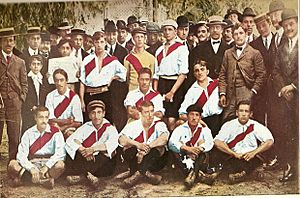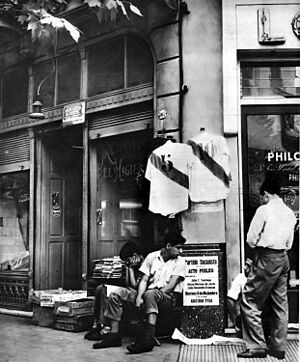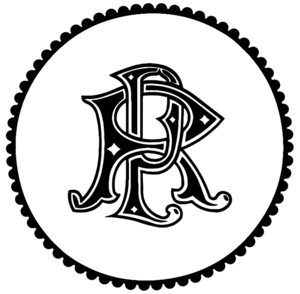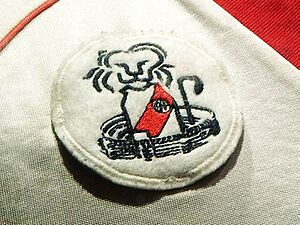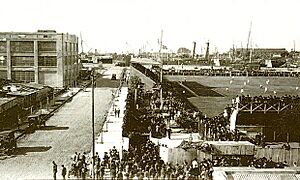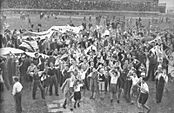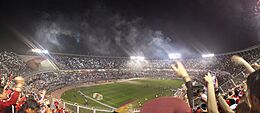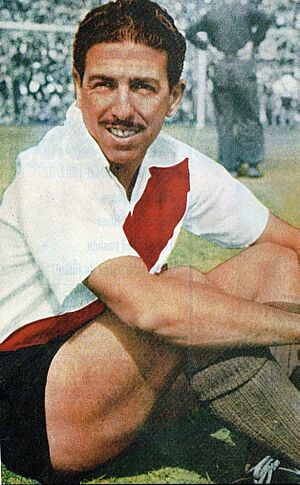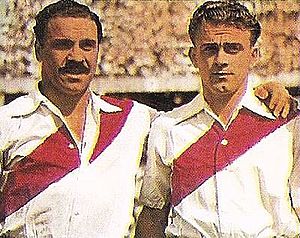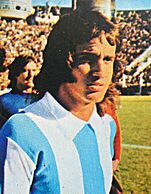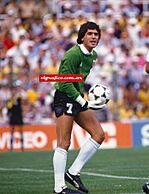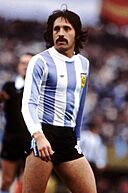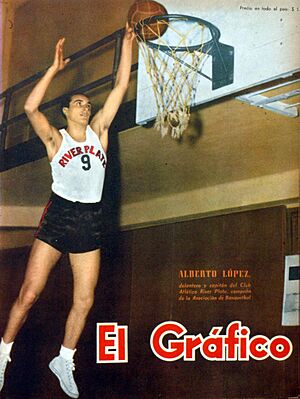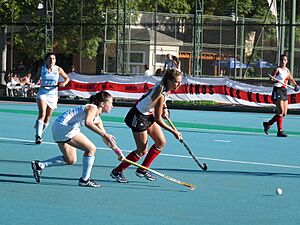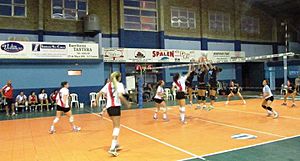Club Atlético River Plate facts for kids
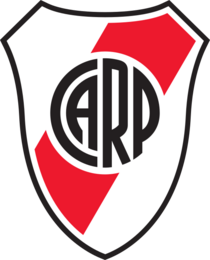 |
||||
| Full name | Club Atlético River Plate | |||
|---|---|---|---|---|
| Nickname(s) | Los Millonarios (The Millionaires) La Banda (The Stripe) El Más Grande (The Greatest) |
|||
| Short name | River | |||
| Founded | 25 May 1901 | |||
| Ground | Estadio Mâs Monumental | |||
| Capacity | 85,018 | |||
| Chairman | Jorge Pablo Brito | |||
| Manager | Enzo Francescoli | |||
| Coach | Marcelo Gallardo | |||
| League | Primera División | |||
| 2024 | 5th | |||
|
||||
Club Atlético River Plate is a famous sports club from Buenos Aires, Argentina. It was started in 1901. The club is named after the Río de la Plata, which is a large river mouth.
River Plate's home stadium, called Monumental, is the biggest in South America. In 2023, River had the most fans attending home games worldwide. Over 350,000 people are members of the club. River Plate is one of the Big Five football clubs in Argentina. The other four are Independiente, San Lorenzo, Boca Juniors, and Racing Club.
Even though River Plate has many sports, it is most famous for its professional association football team. This team has won Argentina's top league, the Primera División, a record 38 times. Their most recent win was in 2023. River Plate has also won 16 national cups. This makes them Argentina's most successful team in their home country with 54 titles.
Internationally, River has won 18 titles. These include four Copa Libertadores and one Intercontinental Cup. They also won the 2014 Copa Sudamericana, 2015 Recopa Sudamericana, and the 2015 Copa Libertadores. This made River Plate the first team to hold CONMEBOL's three main international trophies at the same time.
River Plate is ranked first in the all-time Argentine Primera División table. They have the most points and wins in the league's history. They are also ranked first in the historical table of the Copa Libertadores. This means they have won the most games and gained the most points among South American teams. In 2000, the club was ranked ninth in the FIFA Club of the Century poll. Many great players from the Argentina national team have played for River Plate.
River Plate has a big rivalry with Boca Juniors. Their matches are called the Superclásico. This rivalry is one of the most exciting in sports. Famous players who played for River include Alfredo Di Stéfano and Enzo Francescoli.
Contents
Club History
River Plate was founded on May 25, 1901. It started near the La Boca neighborhood, which is now home to their rivals, Boca Juniors. Two clubs, "Santa Rosa" and "La Rosales," joined together to form River Plate. Leopoldo Bard was chosen as the first president. The name "River Plate" came from an event during the building of Buenos Aires Port. One of the members saw workers playing football near boxes marked "The River Plate." This was the English name for the Río de la Plata.
River Plate joined the Argentine Football Association in 1905. They played their first game in the third division. On December 13, 1908, the team moved up to the first division. They beat Racing Club 2–1. However, the game had to be replayed because River fans celebrated too early. River won the new match 7–0, securing their promotion.
In 1914, River won its first national championship, the Copa de Competencia Jockey Club. They also won their first international title, the Copa de Competencia Chevallier Boutell. The nickname Los Millonarios (The Millionaires) came about in the 1930s. This was after the club bought expensive players like Carlos Peucelle in 1931 and Bernabé Ferreyra in 1932. These players cost a lot of money for that time.
Over the years, River Plate became one of Argentina's most popular teams. The 20th century brought them many victories. With 28 official tournament wins, they were called El Campeón del Siglo (The Champions of the Century).
Team Kit
Kit Design Over Time
|
|
|
|
Kit Sponsors and Manufacturers
Adidas has made River Plate's uniforms since 1982. This is one of Adidas's biggest sponsorship deals worldwide. The partnership signed in 2015 was the most expensive kit agreement in Argentine football history.
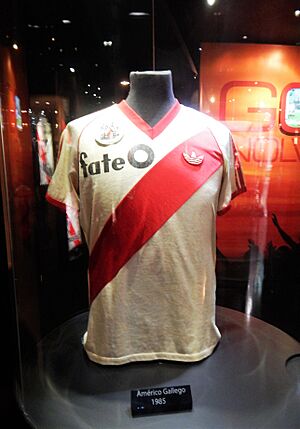
| Period | Kit manufacturer | Shirt sponsor |
|---|---|---|
| 1910–19 | Gath & Chaves | none |
| 1920–32 | St Margaret's | |
| 1979–80 | Sportlandia | |
| 1980–81 | Topper | |
| 1981–82 | Olimpia | |
| 1982–85 | Adidas | |
| 1985–89 | Fate O | |
| 1989–91 | Peugeot and Sevel | |
| 1991–92 | Carta Credencial | |
| 1992–95 | Sanyo | |
| 1996–02 | Quilmes | |
| 2002–06 | Budweiser | |
| 2006–08 | Petrobras | |
| 2009–10 | Petrobras (Main) and Pokerstars.net (Sleeves) | |
| 2010–12 | Petrobras (Main) and Tramontina (Sleeves) | |
| 2012–13 | BBVA (Main) and Tramontina (Sleeves) | |
| 2013–16 | BBVA (Main) and Netshoes (Sleeves) | |
| 2016 | BBVA (Main), Netshoes (Sleeves), and Staples (Shorts) | |
| 2016–18 | BBVA (Main) and Huawei (Sleeves) | |
| 2018 | Huawei (Sleeves), Axe (Shorts), and PES 2019 (Numbers) | |
| 2019–2020 | Turkish Airlines (Main), AXION energy (Sleeves), Axe (Shorts), and PES2020 (Numbers) | |
| 2020–2021 | Turkish Airlines (Main), AXION energy (Sleeves), Axe (Shorts), and eFootball PES 2021 (Numbers) | |
| 2021–2022 | Turkish Airlines (Main), Codere (Sleeves), eFootball 2022 (Numbers) and Assist Card (back low shirt) | |
| 2022 | Turkish Airlines (Main), Codere (Sleeves), eFootball 2022 (Numbers), Amazon Prime Video (back low shirt) and Socios.com (Shorts) | |
| 2022–2023 | Codere (Main), Assist Card (Sleeves), eFootball 2023 (Numbers), Amazon Prime Video (back low shirt) and Socios.com (Shorts) | |
| 2023–2025 | Codere (Main), Assist Card (Sleeves) and DirecTV (back low shirt) | |
| 2025- | Betano (Main), Assist Card (Sleeves) and DirecTV (back low shirt) |
Club Badge
Like many sports teams, River Plate's jersey has a badge. This badge is a symbol of the club. When the River Plate jersey was first made, it did not have a badge. Its look has changed over the years. Today, the badge is sewn onto the jersey. It has three colors: red, white, and black. The design looks like the jersey itself. It has a red stripe across it. The letters "CARP" (for Club Atlético River Plate) are in black. The background is white.
In 1984, Hugo Santilli became the club's chairman. He started a competition to choose a new badge. The goal was to stop rivals, especially Boca Juniors fans, from calling River players "Gallinas" (Hens). Artists from Argentina took part. The club chose a logo designed by Claudio Loiseau. This badge showed a lion wearing a River jersey, rising from the Monumental stadium.
The lion logo was added to the uniforms in 1985. With this emblem, River Plate won the Copa Libertadores de América and the European/South American Cup. When Santilli left the club in 1989, the lion logo was no longer used.
In February 2022, River Plate introduced a new look for the club. This included an updated logo and a special font. A design studio called "Grupo Berro" worked on this new look for over two years.
Rivalry with Boca Juniors
River Plate and Boca Juniors are the two biggest football clubs in Argentina. More than half of the country's football fans support these two teams. Because of this strong rivalry, the Boca Juniors vs River Plate Superclásico match is known worldwide. In 2004, attending this match was even called one of the "Fifty sporting things you must do before you die" by The Observer.
Club Nicknames
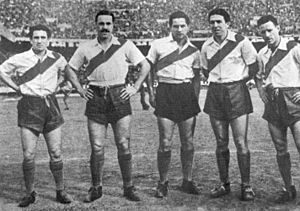
The name "River Plate" was chosen in 1901. At that time, the team was in the La Boca neighborhood, next to the Río de la Plata. Other names like "Club Atlético Forward" were not chosen. Pedro Martínez saw "The River Plate" written on ship containers. He suggested it as the club's name, and it was accepted.
River fans and the media often call the team Los Millonarios (The Millionaires). This nickname started in the 1930s. It was because the club spent a lot of money to buy players from other teams. For example, they bought Carlos Peucelle in 1931 and Bernabé Ferreyra in 1932. These were very large amounts of money back then.
Because of the red stripe on their shirt, River is also called El Equipo de la Banda (the team with the band) or simply La Banda (The Stripe). River Plate's forwards from 1941 to 1946 were known as La Máquina (The Machine). This was because they played so well together.
There was also a River Plate team in the 1950s called La Maquinita (The Little Machine). This was a tribute to the earlier "Machine" team. This team, led by José María Minella, won five championships in six years (1952–57). Famous players like Alfredo Di Stéfano were part of this team.
Stadiums
The Estadio Antonio Liberti, also known as El Monumental, is River Plate's stadium. It is located in the Belgrano neighborhood of Buenos Aires. The stadium opened on May 25, 1938, and can hold 86,000 people. The Argentina national football team often plays its home games here.
Since 1901, River Plate has played in several stadiums:
- Dársena Sur (1901–05, 1907–15): Located in La Boca.
- Sarandí (1906–07): The club moved to this area near a railway station.
- La Boca (1915–23): River built a stadium in La Boca.
- Alvear y Tagle (1923–37): Located in the Recoleta district.
- Antonio V. Liberti (Monumental) (1938–Present): Built where a horse racing track used to be.
Fan Support
In 2023, River Plate had the highest average home attendance for any football club in the world. About 84,567 fans attended each home game. The club also sold out 48 home matches in a row that year. By the end of 2023, River had over 350,000 members. This makes them one of the largest sports clubs by membership globally.
On October 8, 2012, "The world's longest football flag" was shown. About 15,000 River fans carried the 7,830-meter flag through the streets of Buenos Aires. In September 2012, River's away jersey was the most sold worldwide. This was a first for an Argentine club.
In 2015, River Plate played in the 2015 FIFA Club World Cup in Japan. Between 15,000 and 20,000 River fans traveled to Japan. This was a record for the competition.
River Plate has official fan clubs in many Argentine provinces. They also have clubs in Spain, Mexico, Australia, the United States, Paraguay, and Canada. Unofficial fan clubs exist in all Latin American countries and many other parts of the world.
Players
Current Squad
|
|
Players Under Contract
|
|
Players on Loan
|
|
Current Coaching Staff
| Position | Staff |
|---|---|
| Head coach | |
| Assistant coach | |
| Assistant coach | |
| Fitness coach | |
| Fitness coach | |
| Fitness coach | |
| Goalkeeping coach | |
| Goalkeeping coach | |
| Video analyst | |
| Video analyst | |
| Doctor | |
| Doctor | |
| Kinesiologist | |
| Kinesiologist | |
| Neurosciencist | |
| Neurosciencist | |
| Nutrionist | |
| Psychologist |
Last updated: 7 May 2025
Source: Marcelo Gallardo, tras su primera práctica en su regreso a River: cómo quedó conformado su cuerpo técnico
Top Goalscorers
| Rank | Player | Position | Years Played | Goals | Matches |
|---|---|---|---|---|---|
| 1 | FW | 1939–59 | 317 | 515 | |
| 2 | FW | 1964–73, 1974–77 | 217 | 382 | |
| 3 | FW | 1932–39 | 200 | 185 | |
| 4 | FW | 1935–44, 1946–48 | 184 | 320 | |
| 5 | MF | 1970–76, 1977–81, 1984–86 | 158 | 374 | |
| 6 | FW | 1935–46 | 143 | 278 | |
| 7 | FW | 1984–86, 1994–98 | 137 | 217 | |
| 8 | FW | 1931–41 | 118 | 307 | |
| 9 | FW | 1966–71, 1973 | 117 | 207 | |
| 10 | FW | 2001–04, 2011–12, 2014–15 | 112 | 212 |
Most Appearances
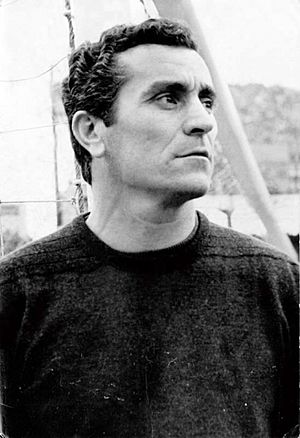
| Rank. | Player | Position | Years Played | Matches |
|---|---|---|---|---|
| 1 | GK | 1945–68 | 520 | |
| 2 | FW | 1939–59 | 515 | |
| 3 | MF | 1969–84 | 500 | |
| 4 | MF | 1970–81 | 466 | |
| 5 | DF | 1938–53 | 393 | |
| 6 | FW | 1964–73, 1974–77 | 382 | |
| 7 | MF | 1970–76, 1977–81, 1983–87 | 374 | |
| 8 | FW | 1942–57 | 367 | |
| 9 | GK | 1974–83 | 361 | |
| 10 | MF | 2007–2008; 2012-2021 | 358 |
Youth Academy: Developing Future Stars
River Plate's youth academy, also known as "El Semillero" (The Seedbed), is very famous. It has produced many talented football players throughout history. The academy's main goal is to train young players for the first team. It also helps them with their education and sports skills.
Many football legends played for River Plate's first team after coming through its youth system. The academy is considered one of the best football training schools in the Americas and worldwide.
Ballon d'Or Winners from River Plate Academy
Two players who came from River Plate's academy won the Ballon d'Or. This award is for the best football player in Europe.
 Alfredo Di Stéfano (won in 1957, 1959, and a special award in 1989)
Alfredo Di Stéfano (won in 1957, 1959, and a special award in 1989) Omar Sívori (won in 1961)
Omar Sívori (won in 1961)
Top South American Players from River Plate Academy
The International Federation of Football History & Statistics (IFFHS) ranked the 50 best South American footballers of the 20th century. Several River Plate academy players were on this list:
| Rank. | Player | Votes | Pos. |
|---|---|---|---|
|
|
161 | FW | |
|
|
82 | FW | |
|
|
24 | FW | |
|
|
19 | FW | |
|
|
12 | FW | |
|
|
8 | DF |
Other Famous Players from River Plate Academy
 Pablo Aimar
Pablo Aimar Matías Almeyda
Matías Almeyda Norberto Alonso
Norberto Alonso Julián Álvarez
Julián Álvarez Leonardo Astrada
Leonardo Astrada Claudio Caniggia
Claudio Caniggia Amadeo Carrizo
Amadeo Carrizo Fernando Cavenaghi
Fernando Cavenaghi Hernán Crespo
Hernán Crespo Andrés D'Alessandro
Andrés D'Alessandro Martín Demichelis
Martín Demichelis Ramón Díaz
Ramón Díaz Enzo Fernández
Enzo Fernández Marcelo Gallardo
Marcelo Gallardo Gonzalo Higuaín
Gonzalo Higuaín Juan José López
Juan José López Ángel Labruna
Ángel Labruna Erik Lamela
Erik Lamela Félix Loustau
Félix Loustau Oscar Más
Oscar Más Javier Mascherano
Javier Mascherano Reinaldo Merlo
Reinaldo Merlo Gonzalo Montiel
Gonzalo Montiel Carlos Morete
Carlos Morete Mateo Musacchio
Mateo Musacchio Ermindo Onega
Ermindo Onega Daniel Onega
Daniel Onega Ariel Ortega
Ariel Ortega Exequiel Palacios
Exequiel Palacios Germán Pezzella
Germán Pezzella Guido Rodríguez
Guido Rodríguez Néstor Rossi
Néstor Rossi Javier Saviola
Javier Saviola Santiago Solari
Santiago Solari Norberto Yácono
Norberto Yácono
FIFA World Cup Winners
Several River Plate players have won the FIFA World Cup with Argentina:
 Norberto Alonso (1978)
Norberto Alonso (1978) Ubaldo Fillol (1978)
Ubaldo Fillol (1978) Leopoldo Luque (1978)
Leopoldo Luque (1978) Oscar Ortiz (1978)
Oscar Ortiz (1978) Daniel Passarella (Captain in 1978, did not play in 1986)
Daniel Passarella (Captain in 1978, did not play in 1986) Héctor Enrique (1986)
Héctor Enrique (1986) Nery Pumpido (1986)
Nery Pumpido (1986) Oscar Ruggeri (1986)
Oscar Ruggeri (1986) Franco Armani (2022)
Franco Armani (2022)
Notable Managers
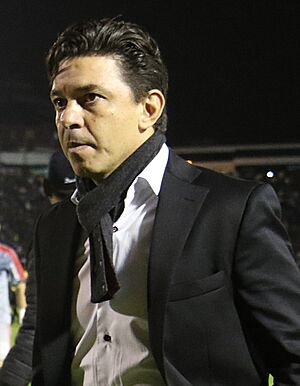
Marcelo Gallardo is the most successful manager in River Plate's history. He won 14 titles. Gallardo was the club's manager from 2014 until November 2022. Under his leadership, River Plate won most of its international championships. He won three Copa Argentina (2016, 2017, 2019) and two Supercopa Argentina (2017, 2019). He was very successful in international competitions. He won two Copa Libertadores (2015, 2018), one Copa Sudamericana (2014), three Recopa Sudamericana (2015, 2016, 2019), and one Suruga Bank Championship (2015). Many of these wins included big victories against their main rivals, Boca Juniors.
Ramón Díaz managed River Plate three times (1995–2000, 2001–02, and 2012–14). He is the club's most successful manager in domestic competitions. He won six Primera División titles and one Copa Campeonato. He also won the Copa Libertadores (1996) and one Supercopa Libertadores (1997).
José María Minella was another important manager. He won eight titles with River Plate. These included seven Primera División championships and one Copa Dr. Ricardo Aldao.
Ángel Labruna had a great career as both a player and a coach for River Plate. As a player, he is the club's all-time top scorer. As a coach, he won six Primera División championships.
Héctor Veira led River Plate to win the Copa Libertadores in 1986. In the same year, the team won the European/South American Cup in Tokyo. He also won the 1985–86 Argentine championship.
Club Achievements
Senior Titles
- Keys
- Record
- (s) Shared record
| Type | Competition | Titles | Winning years |
|---|---|---|---|
| National (League) |
Primera División | 38 | 1920 AAm, 1932 LAF, 1936 (Copa Campeonato), 1936 (Copa de Oro) 1937, 1941, 1942, 1945, 1947, 1952, 1953, 1955, 1956, 1957, 1975 Metropolitano, 1975 Nacional, 1977 Metropolitano, 1979 Metropolitano, 1979 Nacional, 1980 Metropolitano, 1981 Nacional, 1985–86, 1989–90, 1991 Apertura, 1993 Apertura, 1994 Apertura, 1996 Apertura, 1997 Clausura, 1997 Apertura, 1999 Apertura, 2000 Clausura, 2002 Clausura, 2003 Clausura, 2004 Clausura, 2008 Clausura, 2014 Final, 2021, 2023 |
| National (Cups) |
Copa Argentina | 3 |
2016, 2017, 2019
|
| Supercopa Argentina | 3 |
2017, 2019, 2023
|
|
| Trofeo de Campeones (LPF) | 2 |
2021, 2023
|
|
| Copa Campeonato | 1(s) |
2014
|
|
| Copa Jockey Club | 1 |
1914
|
|
| Copa de Competencia (LAF) | 1(s) |
1932
|
|
| Copa Ibarguren | 4 |
1937, 1941, 1942, 1952
|
|
| Copa Adrián C. Escobar | 1 |
1941
|
|
| International | Copa Libertadores | 4 |
1986, 1996, 2015, 2018
|
| Copa Interamericana | 1 |
1986
|
|
| Supercopa Libertadores | 1 |
1997
|
|
| Copa Sudamericana | 1 |
2014
|
|
| Recopa Sudamericana | 3 |
2015, 2016, 2019
|
|
| Suruga Bank Championship | 1 |
2015
|
|
| Tie Cup | 1 |
1914
|
|
| Copa Aldao | 5 |
1936, 1937, 1941, 1945, 1947
|
|
| Worldwide | Intercontinental Cup | 1 |
1986
|
Other Titles
River Plate has also won titles in lower divisions:
- Primera B Nacional: 2011–12
- Segunda División: 1908
Youth Titles
- U-20 Copa Libertadores: 2012
Friendly Titles
River Plate has won many friendly tournaments, including:
- Torneo Internacional Nocturno: 1944
- Copa Tres Ciudades: 1947
- Torneo Triangular: 1962
- Copa Ciudad de Bogotá: 1964
- Copa Confraternidad Iberoamericana: 1964
- Feria de Cali: 1965
- Copa Ciudad de Buenos Aires: 1969
- Torneo Villa de Madrid: 1978
- Torneo de Campeones: 1979
- Torneo Cuadrangular Rosa de Oro de Querétaro: 1985
- Copa 85th Aniversario: 1986
- Copa Misiones: 1986
- Copa Trasandina: 1992
- Supercopa Euroamericana: 2015
- Triangular Internacional Sodimac: 2022
Other Sports at River Plate
Besides football, River Plate offers many other sports. These include athletics, basque pelota, bowls, chess, basketball, handball, cestoball, gymnastics, field hockey, karate, roller hockey, roller skating, swimming, taekwondo, tennis, volleyball, waterpolo, and eSports.
Basketball Team
The basketball team plays in the Torneo Federal de Básquetbol. In 1950, the first FIBA World Championship was held in Buenos Aires. Argentina won the gold medal with three River Plate players: Alberto López, Leopoldo Contarbio, and Vito Liva. The club won a Campeonato Argentino title in 1983. They also finished second in the Campeonato Sudamericano de Clubes Campeones de Básquetbol in 1984.
River Plate's team reached the finals of the Liga Nacional de Básquetbol in 1988. Since 2014, River Plate has returned to national basketball tournaments.
Field Hockey Team
The women's field hockey team is called Las Vikingas. They play in the top division of regional hockey in Argentina. In 2016, Las Vikingas won their first Metropolitano championship. They beat Ciudad de Buenos Aires 3–2 in the final.
In 2017, Las Vikingas won their third straight Hockey National League. This made them one of the clubs with the most titles in the national tournament. Two River Plate players, Lucina von der Heyde and Bianca Donati, played in the 2018 Women's Hockey World Cup. Von der Heyde was named the FIH Rising Star of the Year.
Futsal Team
The futsal team plays in the Argentine División de Honor. The team won three championships in 1991, 2002, and 2003. They also won two Copa Argentina de Futsal in 2016 and 2017. In 2013, the team finished third in the Copa Libertadores de Futsal.
Handball Team
River Plate is one of the clubs that started the Federación Metropolitana de Balonmano (Fe.Me.Bal.). It has won more championships in local history than any other club.
The men's team has won 32 national titles. They also won the gold medal in the South American Men's Club Handball Championship in 1984. The women's team has won 9 national titles. They also won a silver medal in the South American Women's Club Handball Championship in 1984.
Swimming Team
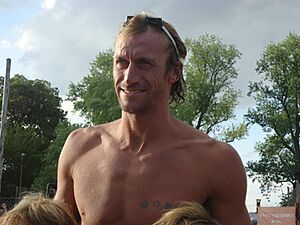
River Plate's swimming team started again in 2003. The goal was to create the best team in the country. This effort was led by Professor Rodolfo Sacco. The team included José Meolans, one of Argentina's most successful swimmers.
Many top swimmers joined River Plate to be part of this strong team. Other River Plate swimmers who represented Argentina in the Olympics include Georgina Bardach and Damián Blaum.
Tennis Team
Tennis has been played at River Plate since 1923. The club has 10 clay courts and one hard court. River Plate is known for having many teams in official tournaments. They also host important events to help tennis grow in the country.
Gabriela Sabatini, considered the best Argentine women's tennis player ever, started playing at River at age 6. She trained there for seven years. At 12, she won a major junior competition in Caracas.
Volleyball Team
The River Plate women's volleyball team has won the national title four times. They are one of the top champions in the league. They were also the first team to win three times in a row (2005 to 2007).
The men's volleyball team won the Liga Argentina de Voleibol in the 1998–99 season. They also won the Súper 4 in 2003. The team has won 8 Metropolitan Leagues between 1956 and 2011.
Women's Football Team
The River Plate women's football team plays in the Campeonato de Fútbol Femenino. They have won the championship 11 times. Five of these wins were in a row from 1993 to 1997. The team finished third in the 2017 Copa Libertadores Femenina.
|
See also
 In Spanish: Club Atlético River Plate para niños
In Spanish: Club Atlético River Plate para niños
 | Delilah Pierce |
 | Gordon Parks |
 | Augusta Savage |
 | Charles Ethan Porter |


